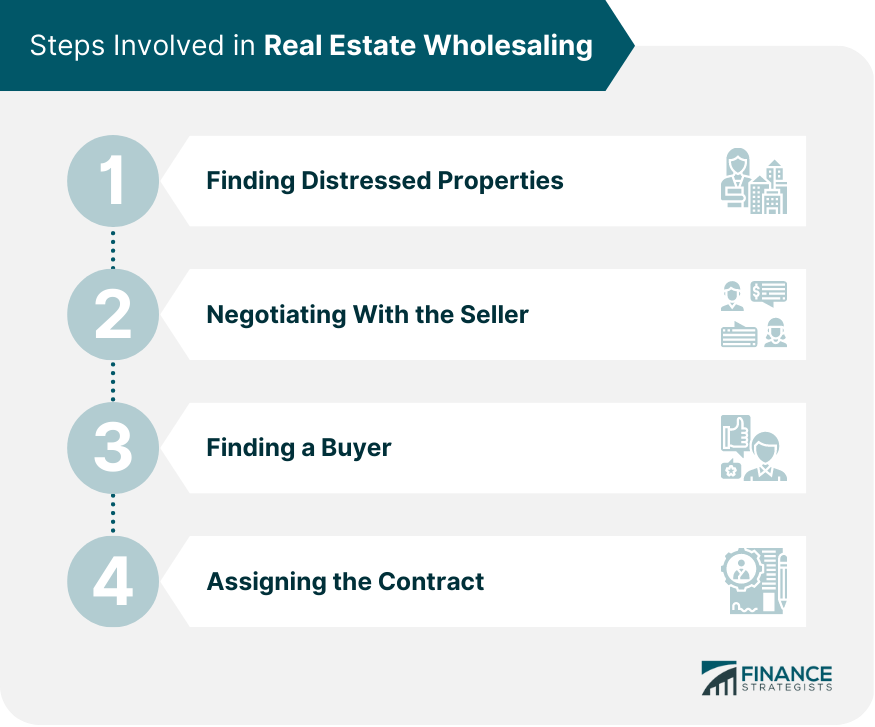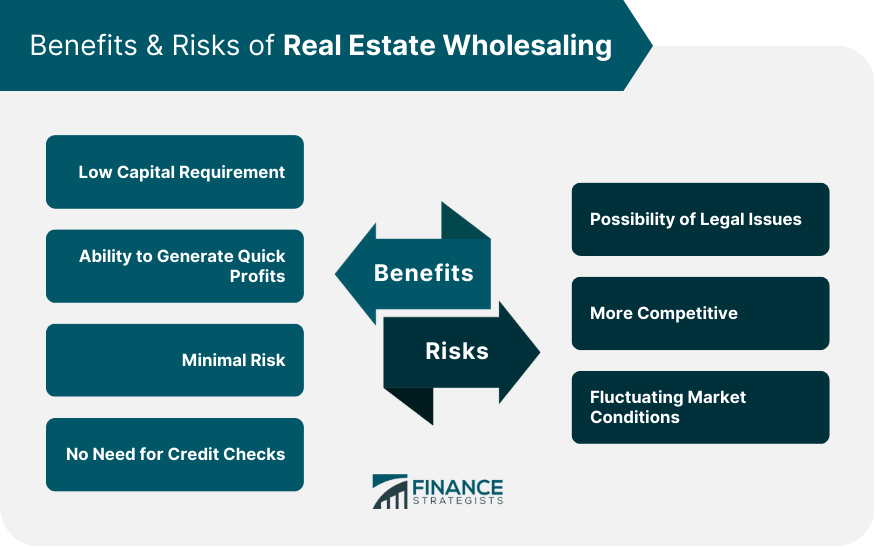Real estate wholesaling involves the intermediary process of searching for distressed properties, bargaining with the seller to purchase the property below market value, and then transferring the contract to a buyer for a profit. For their role as an intermediary between the seller and the buyer, the wholesaler receives a fee as compensation. The wholesaling process starts with the wholesaler finding a distressed property that is typically in poor condition or facing foreclosure. Typically, the wholesaler negotiates with the seller to purchase the property at a discounted price ranging from 30-50% below its market value. Once the wholesaler has secured the property, they find a buyer willing to purchase it for slightly higher than what they paid. The difference between the purchase and sale prices is the wholesaler's profit. Real estate wholesaling typically involves four main steps: 1. Finding Distressed Properties. The first step is to find properties that are distressed and, therefore, likely to be sold at a discount. 2. Negotiating With the Seller. The next step is to negotiate a deal with the seller to buy the property at a price that is below market value. To be successful at real estate wholesaling, investors must possess several key skills, including: Understanding of the Real Estate Market. Wholesalers must understand the real estate market well, including property values, market trends, and local regulations. Negotiation Skills. Wholesalers must be able to negotiate effectively with sellers to secure properties at a price that will allow them to make a profit. Marketing Skills. Wholesalers must be able to market the property effectively to potential buyers to secure a quick sale. Real estate wholesaling offers several benefits to investors, including: Low Capital Requirement. Wholesaling requires minimal capital upfront, making it an accessible investment strategy for those with limited funds. Ability to Generate Quick Profits. Wholesaling can generate profits quickly, as the entire process can be completed in a matter of weeks. Minimal Risk. Since the wholesaler is not actually buying the property, they assume minimal risk. No Need for Credit Checks. Wholesaling does not require the investor to have good credit or secure financing, as they are not purchasing the property. While real estate wholesaling offers several benefits, risks are also involved, including: Possibility of Legal Issues. Wholesalers must carefully follow all legal requirements when assigning contracts, as failure to do so can result in legal issues. More Competitive. As wholesaling has become increasingly popular, the market has become more competitive, making it more difficult to find good deals. Fluctuating Market Conditions. Wholesalers must be prepared to deal with fluctuating market conditions, including changes in property values and interest rates. When it comes to real estate investing, two popular strategies are wholesaling and flipping. While they may seem similar, there are significant differences between the two, including the amount of time and effort required and the potential profitability. As we discussed earlier, real estate wholesaling involves finding distressed properties, negotiating a deal with the seller, and then assigning the contract to a buyer for a profit. The wholesaler acts as a middleman between the seller and the buyer and earns a fee for their services. One significant advantage of wholesaling is that it requires minimal capital and can be completed quickly, usually in a matter of weeks. Wholesaling also carries little risk, as the wholesaler does not actually own the property and is not responsible for any repairs or maintenance. On the other hand, flipping involves purchasing a property, making repairs or renovations, and then selling it for a profit. Flipping requires a larger capital investment upfront and can take several months or even years to complete, depending on the extent of the renovations needed. While flipping can be more time-consuming and risky than wholesaling, it also has the potential for higher profits. A well-done flip can result in a significant return on investment in a hot real estate market. When considering whether to pursue wholesaling or flipping, there are several factors to consider. One is your financial situation. If you have limited funds, wholesaling may be a better option since it requires less capital upfront. However, flipping may be a better choice if you have more significant financial resources since it has the potential for higher profits. Another factor to consider is your experience and skills. Wholesaling requires negotiation, marketing skills, and a good understanding of the real estate market. Flipping, on the other hand, requires knowledge of construction and renovation and the ability to manage contractors and budgets effectively. It is also important to consider market conditions when choosing between wholesaling and flipping. Flipping can be a profitable strategy in a hot real estate market, but in a slow market, finding buyers may be more challenging. Wholesaling, on the other hand, can be a viable strategy in any market, as distressed properties will always be available. Real estate wholesaling and flipping can be profitable investment strategies but require different time, effort, and financial resources. When choosing between the two, it is important to consider your financial situation, experience, and current real estate market conditions. Ultimately, the right strategy depends on your individual goals and circumstances. Real estate wholesaling is a popular investment strategy that can generate quick profits with minimal capital and risk. To succeed at wholesaling, investors must possess key skills such as understanding the real estate market, negotiation skills, and marketing skills. However, risks are also involved, such as the possibility of legal issues, competition, and fluctuating market conditions. Overall, real estate wholesaling can be an excellent way for novice investors to get started in the real estate industry or for experienced investors to diversify their investment portfolios. It is essential to do thorough research and due diligence before getting started and stay up-to-date on market conditions and legal requirements. If you are interested in real estate wholesaling, consider working with a mentor or joining a real estate investment club to gain knowledge and experience. With the right skills and strategies, real estate wholesaling can be a profitable and rewarding investment opportunity. However, real estate wholesaling may not be suitable for everyone, and it is crucial to consult a financial advisor before making any investment decisions. A financial advisor can provide valuable investment strategies, risk management, and financial planning guidance. They can help you develop a comprehensive investment plan that aligns with your financial goals and risk tolerance. What Is Real Estate Wholesaling?
How Real Estate Wholesaling Works
3. Finding a Buyer. Once the wholesaler has secured the property, they must find a buyer willing to purchase it for slightly higher than what they paid.
4. Assigning the Contract. The final step is to assign the contract to the buyer, who will complete the property purchase. The wholesaler earns a fee for their services, which is typically a percentage of the sale price.
Key Skills for Real Estate Wholesaling
Benefits of Real Estate Wholesaling
Risks of Real Estate Wholesaling

Real Estate Wholesaling vs Flipping
Real Estate Wholesaling
Real Estate Flipping
Which One Is Better?
Conclusion
What Is Real Estate Wholesaling? FAQs
Real estate wholesaling is an investment strategy that involves finding distressed properties, negotiating a deal with the seller, and then assigning the contract to a buyer for a profit. The wholesaler acts as a middleman between the seller and the buyer and earns a fee for their services.
Real estate wholesaling offers several benefits, including low capital requirements, the ability to generate quick profits, minimal risk, and no need for credit checks.
To succeed at real estate wholesaling, investors must possess key skills such as understanding the real estate market, negotiation skills, and marketing skills.
While real estate wholesaling offers several benefits, risks are involved, including the possibility of legal issues, competition, and fluctuating market conditions.
Yes, it is crucial to consult a financial advisor before making any investment decisions. A financial advisor can provide valuable investment strategies, risk management, and financial planning guidance.
True Tamplin is a published author, public speaker, CEO of UpDigital, and founder of Finance Strategists.
True is a Certified Educator in Personal Finance (CEPF®), author of The Handy Financial Ratios Guide, a member of the Society for Advancing Business Editing and Writing, contributes to his financial education site, Finance Strategists, and has spoken to various financial communities such as the CFA Institute, as well as university students like his Alma mater, Biola University, where he received a bachelor of science in business and data analytics.
To learn more about True, visit his personal website or view his author profiles on Amazon, Nasdaq and Forbes.















